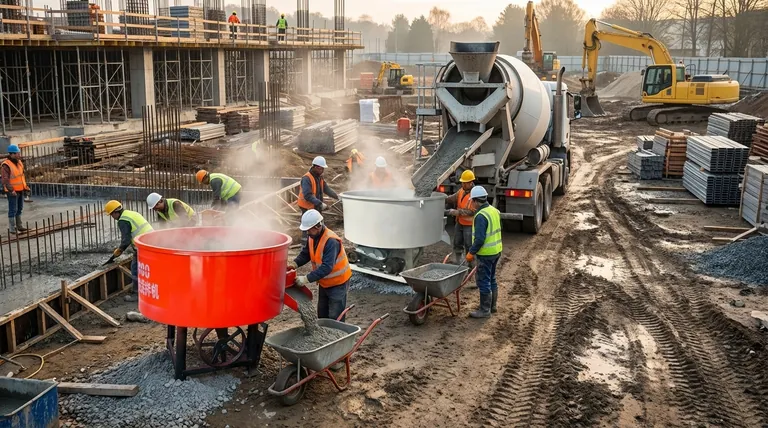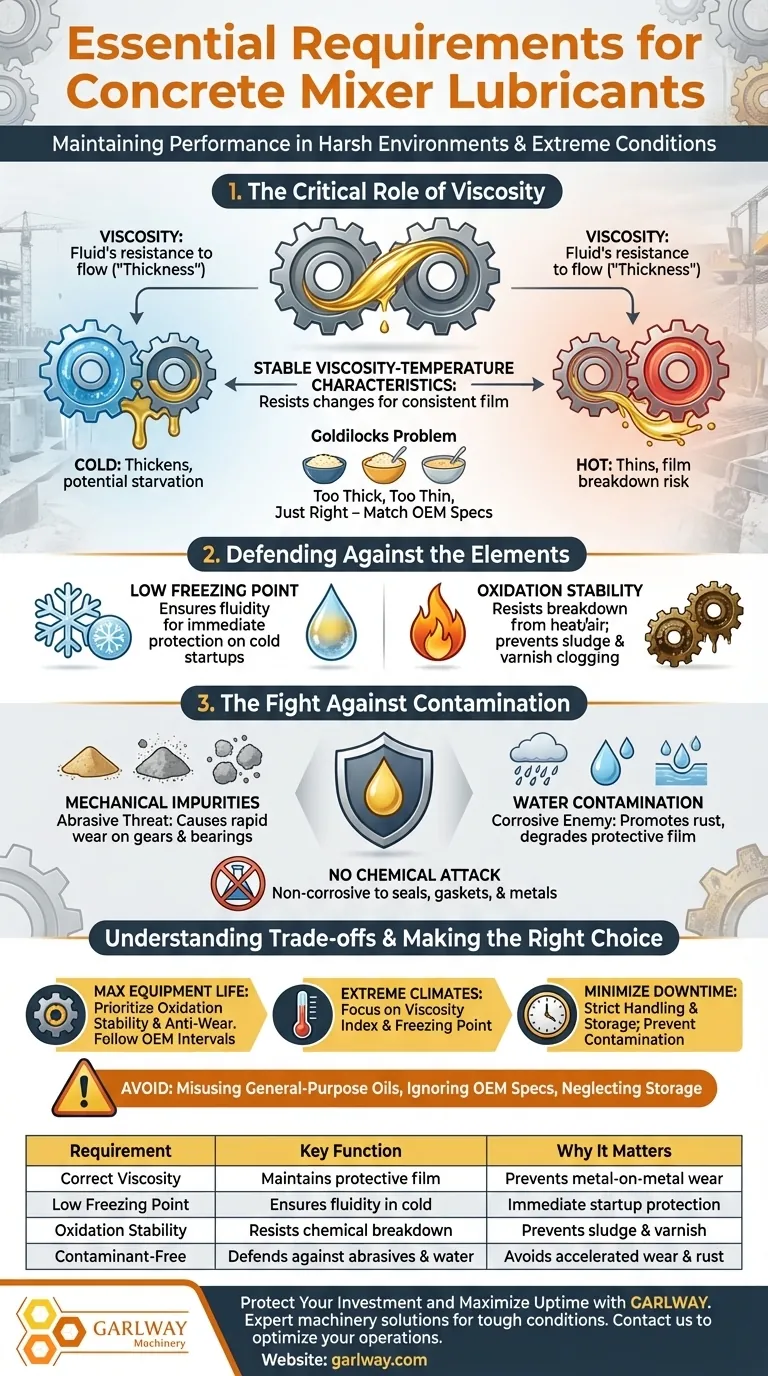The right lubricant for a concrete mixer must possess a specific viscosity that holds up under temperature changes, a low freezing point, strong oxidation stability, and be completely free of contaminants. These requirements ensure the lubricant can protect the machinery from friction, extreme weather, and the harsh, dirty environment of a construction site.
The core challenge for a concrete mixer lubricant isn't just reducing friction; it's about maintaining performance consistency across extreme temperatures and aggressively defending against the contamination and corrosion inherent to the job.

The Critical Role of Viscosity
The single most important property of a lubricant is its viscosity. This property dictates the strength and durability of the protective film between moving metal parts.
What is Viscosity?
Viscosity is a fluid's resistance to flow. In simple terms, it's the "thickness" of the oil. This thickness is what creates a load-bearing film that prevents metal-on-metal contact in gears and bearings.
Why Temperature Matters
A lubricant's viscosity changes with temperature. It thins out when hot and thickens when cold. A high-quality lubricant needs good viscosity-temperature characteristics, meaning it resists these changes and maintains a stable film across the mixer's full operating range—from a cold morning startup to peak heat during a long pour.
The "Goldilocks" Problem
The viscosity must be precisely matched to the equipment's design. If the lubricant is too thick (high viscosity), it won't flow properly, leading to component starvation and increased drag. If it's too thin (low viscosity), the protective film will break down under pressure, causing accelerated wear.
Defending Against the Elements
A concrete mixer operates in an unforgiving environment. The lubricant must be engineered to withstand extreme conditions without degrading.
The Importance of a Low Freezing Point
In colder climates, the lubricant must remain fluid. A low freezing point ensures the oil can circulate immediately upon startup, providing critical protection when the components are most vulnerable. If the oil is too thick or frozen, it can lead to catastrophic failure.
Resisting Oxidation and Breakdown
The combination of high temperatures, air, and pressure causes oil to oxidize, or break down chemically. Good oxidation stability prevents the formation of sludge and varnish, which can clog passages, restrict flow, and coat internal parts, leading to overheating and wear.
The Fight Against Contamination
Contaminants are the primary enemy of any lubrication system, and they are abundant on a construction site. The lubricant's formulation and handling are the first lines of defense.
Mechanical Impurities: The Abrasive Threat
The lubricant must be free from mechanical impurities. Dust, sand, and cement particles are highly abrasive. If they enter the system, they become suspended in the oil and act like a liquid grinding compound, rapidly destroying gears and bearings.
Water: The Corrosive Enemy
A mixer is frequently exposed to rain and high-pressure wash-downs. The lubricant must be free from water, which promotes rust and corrosion on internal surfaces. Water contamination also severely degrades the lubricant's ability to form a protective film.
Preventing Chemical Attack
The base oil and its additives must be inherently non-corrosive. They should not contain any substances that could chemically attack the metals, seals, or gaskets within the mixer's gearbox and hydraulic systems.
Understanding the Trade-offs
Selecting the wrong lubricant or handling it improperly can be just as damaging as using no lubricant at all. Awareness of common errors is crucial for equipment reliability.
Misusing General-Purpose Oils
Not all lubricants are created equal. A heavy-duty gear oil for a mixer's transmission has a vastly different additive package than a standard engine oil. Using the wrong type can lead to foaming, seal failure, or an inability to handle the extreme pressures found in gear systems.
Ignoring Manufacturer Specifications
The Original Equipment Manufacturer (OEM) specifies the precise viscosity grade and performance standard required for their equipment. Deviating from this recommendation is a significant gamble that can void warranties and lead to premature failure.
Neglecting Proper Storage and Handling
Even the highest-quality lubricant is rendered ineffective if it's contaminated before use. Storing drums or containers in a clean, dry area and using dedicated, clean transfer equipment is non-negotiable to prevent the introduction of water and dirt.
Making the Right Choice for Your Mixer
Your selection process should be guided by your operational realities and a commitment to protecting your asset.
- If your primary focus is maximum equipment life: Prioritize lubricants with excellent oxidation stability and a robust anti-wear additive package, and always adhere to the OEM's specified change intervals.
- If you operate in extreme climates: Pay close attention to the lubricant's viscosity index and freezing point to ensure reliable protection during both frigid starts and high-heat operation.
- If your primary focus is minimizing downtime: Implement strict handling and storage procedures to prevent contamination from water and dust, as these are the fastest paths to catastrophic failure.
Choosing the correct lubricant is not an expense; it is a critical investment in your equipment's reliability and longevity.
Summary Table:
| Requirement | Key Function | Why It Matters |
|---|---|---|
| Correct Viscosity | Maintains protective film between parts | Prevents metal-on-metal contact and wear |
| Low Freezing Point | Ensures fluidity in cold weather | Provides immediate protection on startup |
| Oxidation Stability | Resists chemical breakdown | Prevents sludge and varnish formation |
| Contaminant-Free | Defends against abrasive particles and water | Avoids accelerated wear, rust, and corrosion |
Protect Your Investment and Maximize Uptime with GARLWAY
Choosing the right lubricant is critical, but so is partnering with an equipment expert who understands the harsh demands of your construction site. GARLWAY specializes in providing robust construction machinery, including reliable concrete mixers, winches, and batching plants, built to perform in the toughest conditions.
Let our expertise help you:
- Select the right equipment designed for durability and ease of maintenance.
- Optimize your operational procedures to extend machinery life and reduce costly downtime.
Contact GARLWAY today for a consultation on how our solutions can enhance your project's efficiency and protect your valuable assets.
Visual Guide

Related Products
- Commercial Construction Mixer Machine for Soil Cement Mixing Concrete
- HZS75 Concrete Batching Plant Cement Mixer Price Concrete Mixer Bunnings Mixing Plant
- HZS180 Ready Mix Concrete Plant for Foundations with Sand and Cement
- Hydraulic Concrete Mixer Machine Cement Mixing Equipment for Mixture Concrete
- Construction Products Concrete Plant Machine Mixing Concrete Mixer
People Also Ask
- What are the main types of concrete mixers available? Find the Right Mixer for Your Project
- What versatility advantages do self-loading mobile concrete mixers offer? Unlock On-Site Production Anywhere
- What are some key characteristics of modern mortar mixers? Precision Blending for Superior Mortar
- What industry standards govern volumetric mixer manufacturing? The VMMB Guide to Quality & Safety
- What happens if a cement mixer is overloaded? Avoid Costly Breakdowns and Weak Concrete
- What are batch mixers best suited for? Maximize Precision & Quality in Your Projects
- How do self-loading concrete mixers benefit construction in rural or remote areas? Achieve Total On-Site Concrete Independence
- What are the advantages of concrete mix design? Optimize Cost and Performance for Your Project















